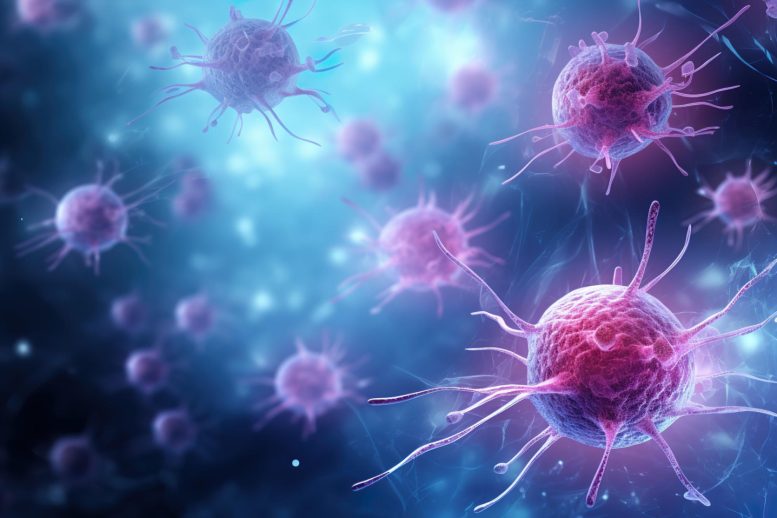Discovering the Connection Between Unhealthy Eating Habits and Cancer

Scientists from the National University of Singapore have discovered that methylglyoxal, a substance often linked to a poor diet and diabetes, can increase the chances of developing cancer by damaging DNA and interfering with the genes that normally prevent cancer. This discovery could be instrumental in the development of new cancer prevention strategies.
It has been discovered that a compound related to unhealthy eating habits or uncontrolled diabetes could augment the risk of cancer over time. This underscores the potential of a new mechanism through which tumours may form.
The team of researchers from the National University of Singapore (NUS) has unearthed novel insights that could shed light on the connection between cancer risk, unhealthy diets, and diseases linked to poor nutrition like diabetes. These findings hold potential for devising strategies aimed at cancer prevention and promoting healthy ageing.
The research was spearheaded by Professor Ashok Venkitaraman and was carried out by scientists from the Cancer Science Institute of Singapore (CSI Singapore), NUS, and NUS Centre for Cancer Research (N2CR). They also collaborated with colleagues from the Agency for Science, Technology and Research (A*STAR).
Professor Venkitaraman, the Director of CSI Singapore, stated, “Cancer results from the collaboration between our genes and environmental factors like diet, exercise, and pollution. The way these environmental factors increase the risk of cancer is not yet fully understood. It is imperative to comprehend this interplay if we're to adopt preventive strategies that can foster long term health.”
The researchers primarily focused on individuals with a high risk of developing breast or ovarian cancers due to inheriting the faulty BRCA2 gene from their parents. The team found that cells from these patients were especially prone to the effects of methylglyoxal, a substance produced when cells metabolize glucose for energy. The study proved that this compound can instigate anomalies in our DNA that serve as early indications of possible cancer development.
The research also indicated that individuals who do not have a faulty BRCA2 gene but have elevated levels of methylglyoxal, such as those with diabetes or pre-diabetes linked to obesity or a poor diet, may accumulate these early warning signs, suggesting an increased cancer risk.
Professor Venkitaraman further explained that their research implicates high methylglyoxal levels with an increased cancer risk. A blood test for HbA1C can detect high methylglyoxal levels, and it might be used as a marker. As high methylglyoxal levels can be generally controlled with medication and a balanced diet, this offers opportunities for proactive steps against the onset of cancer.
Dr. Li Ren Kong, the study’s first author and Lee Kuan Yew Fellow from N2CR, said that they started this research to comprehend the factors increasing the risk in families prone to cancer, but they ended up unveiling a profound correlation between an essential energy consumption pathway and cancer development. This discovery underscores the relevance of diet and weight management in managing cancer risks.
Interestingly, the team's findings also led to a revision of an old theory about cancer-preventing genes, known as the Knudson’s "two-hit" paradigm. The NUS team found that methylglyoxal could temporarily incapacitate these cancer-preventing genes. This implies that continual instances of poor diet or uncontrolled diabetes can aggregate over time, raising the risk of cancer.
The research, which was published in the prestigious scientific biomedical journal, Cell, on 11 April 2024, provided a substantial contribution to the field.
Moving forward, the team intends to delve deeper into the role that metabolic disorders, such as diabetes or poor diets, play in the risk of developing cancer in Singapore and other Asian countries.
The researchers hope to uncover new mechanisms that underlie the connection they've found between metabolism, diet, and cancer risk. This discovery could pave the way for the development of more effective preventives measures or potentially delay the onset of cancer.
Reference: “A glycolytic metabolite bypasses “two-hit” tumor suppression by BRCA2” by Li Ren Kong, Komal Gupta, Andy Jialun Wu, David Perera, Roland Ivanyi-Nagy, Syed Moiz Ahmed, Tuan Zea Tan, Shawn Lu-Wen Tan, Alessandra Fuddin, Elayanambi Sundaramoorthy, Grace Shiqing Goh, Regina Tong Xin Wong, Ana S.H. Costa, Callum Oddy, Hannan Wong, C. Pawan K. Patro, Yun Suen Kho, Xiao Zi Huang, Joan Choo, Mona Shehata, Soo Chin Lee, Boon Cher Goh, Christian Frezza, Jason J. Pitt and Ashok R. Venkitaraman, 11 April 2024, Cell. DOI: 10.1016/j.cell.2024.03.006




